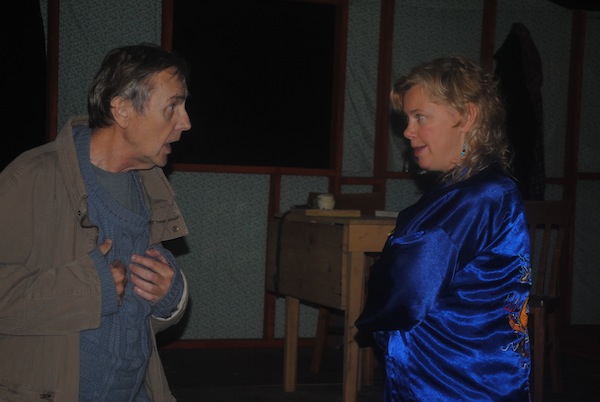 One of the characters in Out The Meadow tells of a certain species of birds that kills itself by the hundreds while doing what comes naturally: they gather at the Canso Causeway and dive into the water to feast on the schools of fish trapped in the waters of the Canso Strait.
One of the characters in Out The Meadow tells of a certain species of birds that kills itself by the hundreds while doing what comes naturally: they gather at the Canso Causeway and dive into the water to feast on the schools of fish trapped in the waters of the Canso Strait.
Clutching their catch, they soar heedless of the power lines above them. Dozens of them get caught in the lines and end their lives in a death spiral into the hard pavement below.
“You’d think they’d learn,” the character observes (and I paraphrase), “but someone yells ‘Fish!’ and off they go again.”
The argument might be that, in birds at least, instinct trumps experience, but as this play sets out to prove, people might not be much more evolved than birds.
Out The Meadow has had two extremely well received productions by mainland theatre groups, but this current production marks its Cape Breton debut under the direction of the play’s writer, Bev Brett.
While the characters and events hew close to Brett’s own life, as a program note emphasizes, the action of the play has been dramatically fictionalized.
The story is simple enough. Lisa (Carolyn Dunn), a refugee from the American suburbs, has come to the north shore of Cape Breton to find spiritual solace and musical inspiration after her previous relationship literally burned to the ground. While renovating her new house, she “inherits” fix-it man, Archie (Todd Hiscock), who has a busted relationship in his past, a son he sees not often enough to feel a proper father to, and a busted shoulder that limits his work options but has been ajudged by the workers’ comp to be not that bad.
Lisa and Archie fall in love and move in together, contentedly identifying and keeping records of the birds swarming around the feeders in the yard. Besides his buddy Malchie (Nick Sobol) who uses his “unjust” firing from the “World Village” up the road to launch a political protest campaign, Archie has other problems: he is a binge drinker.
Archie’s various problems snowball making him angry, violent, and ultimately despairing.
That Brett can end her play on an optimistic beat that doesn’t sell short the turbulent emotion journey she had taken her audience on proves her skill as a playwright and a wise observer of the human condition.
The play itself operates all at once on several levels: charming romantic comedy, blistering examination of the depths of alcoholism, sly and subtle satire of “come from away-ers” misappropriating a culture they misapprehend for their own purposes, and an honest depiction of a rural culture built more on favours between neighbours than ready cash flow.
It is funny, frightening, forthright, and fulfilling.
And Brett has carefully chosen a cast capable of playing on all of the various levels of her script.
Carolyn Dunn, as Lisa, has moments of great vulnerability and great resolve. She can be sensuous without losing any of the character’s intelligence. It is a role because Lisa has to give over her life to trying to save Archie’s without giving up her own identity, and Dunn manages to keep Lisa’s anguish real and involving.
Nick Sobol, as Malchie, begins as almost a comic relief character, but ends as a fully rounded character, gaining in wisdom and stature during his handful of scenes. Sobol has a great physicality in all of his performances and that helps to keep Malchie in the audience’s mind’s eye even when he’s off stage.
Todd Hiscock, as Archie, has the most difficult journey: full of charm and jokes and challenges to Lisa’s refusal to be seduced, his character has to become darker and more dangerous without losing the sympathy of the audience. Hiscock elegantly carried these changes off because he managed to convey the depth of Archie’s passion: his ferocious love for Lisa and his son, his ferocious awareness of the loss of his sense of being a proper man–a hard worker, a temperate
character, an upright example for his son. As he loses control over each of these things, all that is left is the ferociousness, and Hiscock expertly captured the tragedy in that ferociousness.
Brett as the director used the intimate space of the Baddeck Masonic Hall well, and more importantly led her cast deep into their characters. She also managed to find humour and pathos in the most unexpected places: an innovative use for bird feeders as code words, and the presence of an owl as a harbinger of disaster (the owls are never what they seem).
This is the third production of this play in under two years: two by mainland theatre companies and the first by Brett’s hometown group, The St. Ann’s Bay Players. It has three more performances in Baddeck: on Friday, October 28, and Saturday, October 29, both at 7:30 pm, and Sunday, October 30, at 2 pm.
Then it comes to St. Alban’s Hall in Sydney’s Whitney Pier for three performances: Friday, November 4, and Saturday, November 5, at 7 pm both nights, and Sunday, November 6, at 2 pm.
Tickets are $15 at the door and are available in advance at the Whitney Pier Pharmasave (564-8250), and the Cape Breton Curiosity Shop on Charlotte Street (564-4660).

